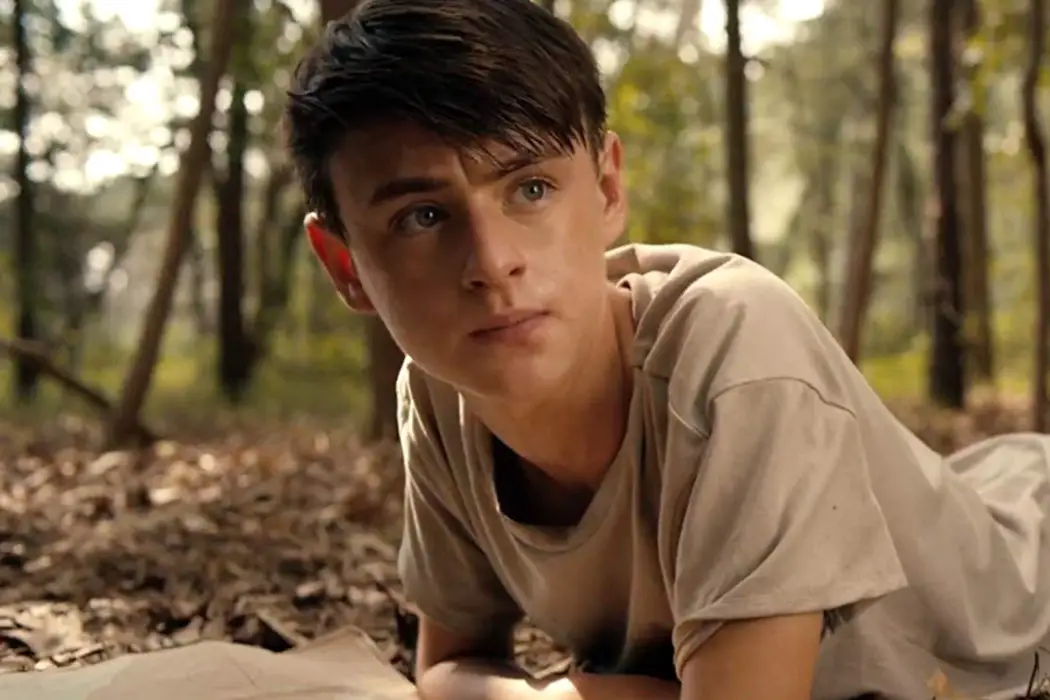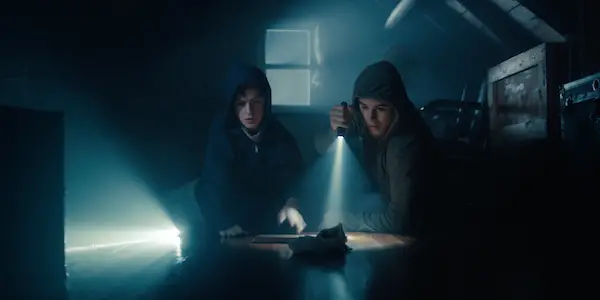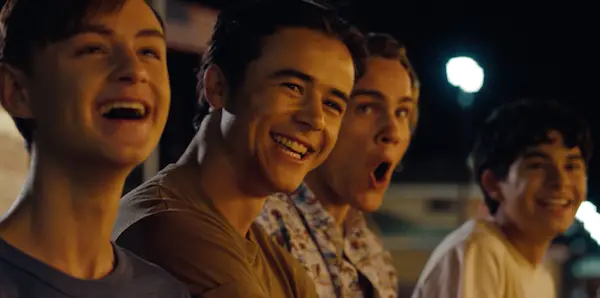LOW TIDE: Boys On The Brink

Michael Colbert is a writer based in Portland, Maine. He…
Summer is high on the Jersey Shore for a group of boys and the Bennys (the tourists from Bayonne, Elizabeth, Newark, New York) who crowd them out of their hometown. Low Tidetells the story of a group of friends – Alan, Red, Smitty, and Peter – who steal jewelry and precious goods from vacation homes of the wealthy.
After they read about the death of the town’s wealthiest landowner, who lived out on the peninsula, they ride their boat to his house after dark and find a sack of gold coins under the floorboards, shimmering in the crawlspace like a genie’s lamp. Once somebody snitches to the local cop – the type who used to be one of them – the group implodes, driven by love, money, and their desires that extend beyond the pier where they go fishing.
Summer Dreams in Sandy Point
Sandy Point, New Jersey wields its own power over the people in the community. In the first scene, Smitty, Alan, and Red rob a cedar-shingled house on the water. Shots down hallways and over the house’s roof frame the boys – and the homeowners returning after a night out – within a space they’re not meant to be. When they return home to Alan and Peter’s home, Peter is watching old shows on TV. Once again, they’re confined by floral wallpaper and feeling the puff of AC through air vents. Their summer exists as a pull between houses of luxury and their own homes, almost always void of adults.
When the boys go to the town boardwalk for a night of smoking, drinking, and catcalling – during which they’re called out for their behavior – colored lights and ocean waves set the backdrop for an evening of summer love. Alan flirts with Mary, a Benny from Connecticut, and they ride in swinging chairs over the boardwalk below. The boys sit at the precipice: here the summer is dreamy, just fun. Nobody has snitched or gone to the police or been held accountable for their actions, and the lighting, set, and editing drive headlong into the dreaminess of the evening. Colored lights melt into the night sky. Toy guns pop through five-star shooting cards.
When they boat out to the deceased landowner’s house, the playfulness continues. They find gold under the floorboards. Music synced to cuts of them opening drawers and peering through thresholds makes a group of boy thieves feel like they’re expert robbers. Their work is still romantic – for what are they but local Robin Hoods or boys burying gold coins and creating a treasure map, complete with an X to mark the spot?

The dreamy music and sharp cuts between scenes fade after they have their first run-in with the police. What begins as boys invincible, cut loose for a summer of their youth, has now become something deeper as they must reckon with the trouble they’ve created by being naive. When the cop takes Alan into the station, he begins saying “boys will be boys” but then pivots the idea, telling Alan that bad guys never think they’re bad. In this move, the film becomes something else: it opens up a case study of a group of boys as it begins to fracture. It asks them to examine themselves as they decide who they will become.
The film acknowledges how it’s a story told before – tension between less well-off locals and the wealthy tourists – with the switch of Red’s blade: just when you think this is something you’re expecting, it revs up to something more intractable. When Red stares down his gun on the kitchen counter, the sense that the four friends are barreling to something out of control is gripping, and the film accelerates through the ending.
Efficiency Operations
At times, the robbing and heists function so much like clockwork. Though maybe they’ve learned home invasion best practices through practice of their own, their early operations verge into something to be admired for their cohesion. The Bennys on the receiving end of their crimes never receive a second thought.
Similarly, the film could do well to uncoil some of its neatness. Alan and Mary’s romance consists of a night at the boardwalk, a date in his new car with dialogue that’s more canned. If earlier tension between the summer people and locals exploded before it could become familiar, writing here relies on what we would expect in this scene: though Alan is still a boy confined by his town and his friends, he might have different things to say on this date when he speaks for himself.

The film leaves no loose ends. Everything is accounted for and interconnected. Everything is perfectly planted and ties together. Nothing is extraneous, but with their plots, with the mistakes the boys make there should be room for error, though the errors they make are always calculated and come back to bite them exactly where it should.
Low Tide, a Case Study
Low Tide calls forth many other summer movies that have come before it. A24’s Hot Summer Nights stylizes summer in fountain drinks and lollipops, boardwalks and cheese fries. Low Tide, instead, draws attention to details of summer boredom: a pet parrot walking on a kitchen counter, Allen dangling the phone cord by his ankles while waiting for Mary to pick up, the ceiling fan circling slowly while Alan and Peter try to fall asleep. In a world where these details come into focus, the boys’ treasure hunt clarifies itself as a fantasy of sorts: through their boredom and lack of other options they come to hatch a plot like this. They help usher it into being and create a story for themselves.
And more significantly, where Hot Summer Nights shows boys thrusting themselves into drug rings and criminals beyond what they can handle, Low Tide scales the conflict within a group of teenage boys that implodes. It explores what drives them, what they make each other do, and how they can’t face each other. Low Tide is a tactile, explosive study of masculinity, an exploration of what boys do, what makes them do it, and how they need to learn to stick up to each other.
Have you seen Low Tide? What did you think? Let us know in the the comments below!
Low Tide was released exclusively on Directv September 5th and in select theaters October 4th.
Does content like this matter to you?
Become a Member and support film journalism. Unlock access to all of Film Inquiry`s great articles. Join a community of like-minded readers who are passionate about cinema - get access to our private members Network, give back to independent filmmakers, and more.
Michael Colbert is a writer based in Portland, Maine. He loves horror film (his favorites are Candyman and Rosemary's Baby), and he’s a coffee addict (his favorites are Costa Rican and Ethiopian). His work has appeared in Avidly, Maine the Way, and Germinal.













